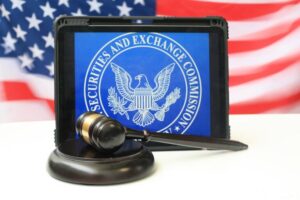SEC v. Ripple Labs: Chamberlain Predicts SEC's Appeal Hurdles

In a significant legal development from July 13, 2023, the U.S. Securities and Exchange Commission (SEC) faced a mixed outcome in its lawsuit against Ripple Labs Inc. and its top executives, Bradley Garlinghouse and Christian A. Larsen. The lawsuit, initiated in December 2020, alleged that Ripple and its leaders had unlawfully offered and sold XRP tokens (which the SEC considers “unregistered securities”), violating Section 5 of the Securities Act 1933. The SEC further contended that Garlinghouse and Larsen were complicit in these purported violations.
The U.S. District Court for the Southern District of New York, presided over by Hon. Analisa Torres, delivered a nuanced ruling on the matter. The court partially granted and partially denied summary judgment motions from both the SEC and Ripple. Specifically, the SEC’s motion concerning the Institutional Sales was granted but denied for other aspects. Conversely, except for the Institutional Sales segment, Ripple’s motion regarding the Programmatic Sales, the Other Distributions, and the sales made by Larsen and Garlinghouse was granted.
A crucial point of contention was the nature of XRP sales by Larsen and Garlinghouse. Judge Torres clarified that these sales were programmatic, executed on digital asset exchanges through blind transactions. Given the anonymity of these transactions, the court determined that they did not satisfy all the criteria of the Howey test, which is used to determine if a transaction represents an investment contract.
Furthermore, Judge Torres emphasized that the XRP token did not inherently represent an “investment contract” per the Howey requirements. She also highlighted that secondary market sales of XRP, where the funds did not trace back to Ripple, could not be conclusively deemed as offers or sales of investment contracts.
On 9 August 2023, the SEC sent a letter to Judge Torres seeking “leave to file an interlocutory appeal as to the two adverse liability determinationsin the July 13, 2023 order … granting summary judgments to the defendants.”
Interlocutory Appeal is a mechanism allowing appellate courts to review specific aspects of a case before its conclusion. However, such appeals are not automatically entertained and are typically reserved for issues that could significantly influence the case’s outcome or present pivotal legal questions.
Later that day, former lawyer Scott Chamberlain weighed in on the SEC’s decision to appeal. Chamberlain expressed his perspective that Judge Torres is likely to deny the SEC’s appeal request. He reasoned that Judge Torres’ ruling was meticulous and did not venture into uncharted legal territory. Instead, she accepted the SEC’s categorization of transaction types and applied the established Howey test to them. Chamberlain highlighted that the SEC’s setback was due to the fact that the undisputed facts of the case did not align with all the criteria of the Howey test for some of their chosen transaction categories.
Featured Image Credit: Photo / illustration by sergeitokmakov via Pixabay
Source: Read Full Article
